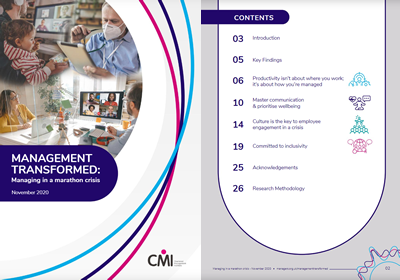Managing a remote workforce comes with challenges as well as upsides – but is a surprising outcome that we appreciate offices more?
The joys of WFH have been a revelation: no more commuting; no more office uniform; no more workplace politics and no more mindless interruptions just as you are trying to concentrate. But WFH has also helped us discover what we miss about the office, and why the office is such an effective arrangement for getting work done.
Here are three reasons the CMI believes why the end of the office is greatly exaggerated:
1. We crave human interaction
Zoom is to live interaction what old 78rpm vinyl records were to live concerts. Zoom is a pale shadow of the real thing. You cannot schedule spontaneity, creativity, joy, laughter, gossip and surprise. We may not like all our colleagues, but we certainly miss them.
2. Some sorts of work require the office
WFH is good for anything requiring uninterrupted concentration, like reviewing legal documents or writing code. Evidence from coders shows that each interruption costs 15 minutes lost time: two interruptions an hour means that you lose half the day.
But most organisational work requires collaboration, creativity and problem solving. You have to align agendas, resolve conflicts and deal with misunderstandings fast, before they spiral out of control. This is hard enough when you can see your colleagues and can talk to them. At least in the office, you can make sure you accidentally bump into someone you need to talk to: a five minute informal chat can often achieve far more than a formally arranged one hour zoom call.
Office gossip matters: that is how you discover where the death star projects and bosses await. It is how you can discover new opportunities which can develop your skills and experience. Working remotely, you are cut off from this vital news flow unless you work your networks hard and deliberately.
3. Managing teams is far easier when you can see your team
It is easy to see who is struggling and who is coasting; you can spot misunderstandings and fix them fast; you can test and adapt ideas quickly; you can see and hear when things go wrong, and respond in real time. Providing support and motivation is far easier in the office. The first person to discover how to motivate people by email will make a fortune. It is a fortune which is unlikely to be made.
Managing people is far harder when you cannot see them.
MFH (Managing From Home) has forced us all to raise our game. Managing people remotely means that you have to be far more purposeful and deliberate in everything you do, to avoid misunderstandings, to manage workloads and to keep projects on track. Informal and ad hoc management can be highly effective in the office and completely ineffective remotely. MFH is a great opportunity to raise your game: if you can apply the lessons you learn from managing remotely when you return to the office, you will have made very good use of the pandemic.
Despite its myriad faults, the office is a highly effective machine for making things happen. We may not go back to the office five days a week, but when we do go back we will value it more than we did in the past.
The CMI has recently released their Management Transformed research, where this subject is debated in a feature ‘what matters more where you work or how you work?’ – You can download or read the CMI’s report online here.




